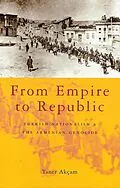Taner Akçam is one of the first Turkish academics to acknowledge and discuss openly the Armenian Genocide perpetrated by the Ottoman-Turkish government in 1915. This book discusses western political policies towards the region generally, and represents the first serious scholarly attempt to understand the Genocide from a perpetrator rather than victim perspective, and to contextualize those events within Turkey's political history. By refusing to acknowledge the fact of genocide, successive Turkish governments not only perpetuate massive historical injustice, but also pose a fundamental obstacle to Turkey's democratization today.
Autorentext
Taner Akçam is Visiting Professor at the University of Minnesota, Twin Cities.
Inhalt
Preface
Introduction
1. What Are Turkey's Fundamental Problems? A Model for Understanding Turkey Today
2. A Theoretical Approach to Understanding Turkish National Identity
3. Some Aspects of Turkish National Identity and the Armenian Genocide
4. The Homogenizing and Ethnic Cleansing of Anatolia
5. The Decision for Genocide in Light of Ottoman-Turkish Documents
6. The Treaties of Sèvres and Lausanne: An Alternative Perspective
7. The Causes and Effects of Making Turkish History Taboo
8. The Genocide and Turkey
9. Some Theoretical Thoughts on the Obstacles to Armenian-Turkish Reconciliation
Select Bibliography
Index
